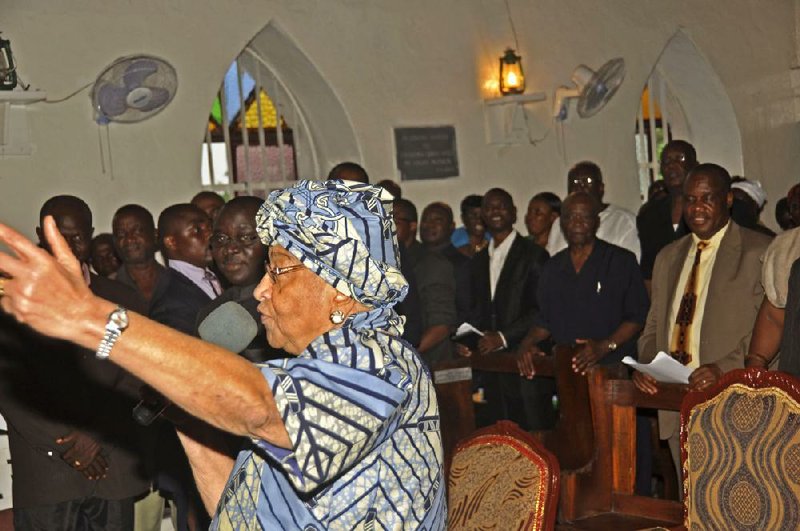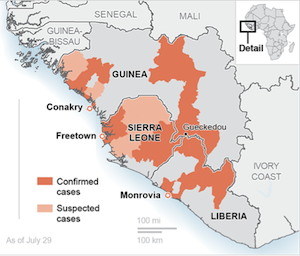LONDON — Facing the worst known outbreak of the Ebola virus, with almost 1,000 fatalities in West Africa, the World Health Organization declared an international public health emergency Friday, demanding an “extraordinary” response — only the third such declaration of its kind since regulations permitting such alarms were adopted in 2007.
The U.N. organization stopped short of saying there should be general international travel or trade bans but acknowledged that the outbreak, already in its sixth month, was far from being contained.
One major international medical organization, Doctors Without Borders, responded to the statement with a renewed call for a “massive deployment” of health specialists to the stricken countries.
“Lives are being lost because the response is too slow,” it said.
Margaret Chan, the World Health Organization’s director general, said, “This is the largest, most severe, most complex outbreak in the nearly four-decade history of the disease.
“I am declaring the current outbreak of the Ebola virus disease a public health emergency of international concern,” she said. “Countries affected to date simply don’t have the capacity to manage an outbreak on this scale on their own.”
The organization made similar emergency declarations to counter swine flu in 2009 and polio in May. But public health experts said the declaration on polio has not reversed or slowed its international spread.
The WHO urged all states where the disease is spreading to declare a state of emergency; to screen all people leaving at international airports, seaports and land crossings; and to prevent travel by anyone suspected of having the Ebola virus.
But the organization did not recommend a ban on travel to or from places with outbreaks because of the low risk of infection. The disease is spread only through very close contact with an infected person, usually through bodily fluids.
According to figures released by the WHO, the virus has claimed 961 lives since March. The total number of confirmed, probable and suspected cases, including the fatalities, was 1,779 on Friday.
Most of the cases are in Guinea, Liberia and Sierra Leone, but at least nine cases also have been reported in Nigeria, where one person died after traveling there from Liberia.
The Nigerian government declared containing the Ebola virus in Africa’s most populous country a national emergency Friday. President Goodluck Jonathan approved spending $11.7 million to fight the disease and urged schools to extend a current holiday to give experts more time to assess the Ebola threat.
Bart Janssens, the director of operations at Doctors Without Borders, said a combination of factors — including denials by the authorities in affected countries and the international community’s slow recognition of the gravity of the crisis — had contributed to delays in gearing up an effective response.
Unlike previous outbreaks of the Ebola virus, which had occurred in isolated areas, the West African epidemic has hit areas with more traffic, trade and freedom of movement, facilitating the transmission of the disease, he said. The affected countries also have extremely weak health infrastructures and lacked the capacity to respond effectively when the outbreak occurred.
“Between February and May it was always ‘there’s no problem,’” Janssens said of the reaction from government authorities in the countries initially affected, “but during that period the epidemic was spreading into many little communities away from the epicenter.”
The international response has also been weak, Janssens said, pointing out that Doctors Without Borders had previously called for a major escalation in international support and had warned that the epidemic was out of control. The WHO’s regional officers, he said, “played a critical role in that failure in the first two to three months.”
In her comments, Chan said the WHO was now “extremely stretched” in its capacity to deal with the epidemic.
The organization has rotated more than 420 international staff members through the region since the start of the outbreak, and this week had 141 international staff members deployed, in addition to the people permanently based there, said Gregory Hartl, a spokesman. Part of the challenge was finding people with relevant experience, he said.
Also Friday, news reports said a suspected case of Ebola had been detected in Uganda, the first such report from East Africa. A traveler from South Sudan was isolated with Ebola-like symptoms of fever, and physicians were awaiting the results of tests, airport officials were quoted as saying. Uganda’s last known outbreak of Ebola was in 2012.
In the U.S., Kent Brantly, an American doctor infected with Ebola, said in a statement that he’s getting stronger every day.
He and another aid worker who also was infected in Liberia, Nancy Writebol, are being treated in an isolation unit at Emory University Hospital in Atlanta. Writebol’s husband, David, who remains in Liberia, said Friday that his wife also appears to be improving.
Meanwhile, a Spanish citizen, the only known European to contract the disease, was flown home from Liberia for medical attention. The European Union said Friday that the risk to Europeans remained “extremely low.”
Information for this article was contributed by Alan Cowell, Nick Cumming-Bruce and Rick Gladstone of The New York Times and by Maria Cheng and staff members of The Associated Press.


